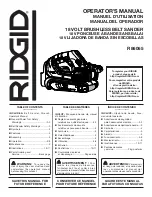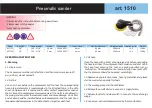
7 — English
OPERATION
WARNING:
Keep hands and fingers away from a moving
sanding belt. Any part of the body coming in
contact with a moving sanding belt could result
in serious injury. Do not wear loose clothing or
jewelry when operating the sander. They could get
caught in moving parts and foreign objects could
get thrown away from the sander causing injury.
DUST COLLECTION BAG
See Figure 8, page 11.
WARNING:
Do not use the dust collection bag when sanding
metal. Using the dust collection bag when sanding
metal creates a fire hazard, which could damage
the tool and lead to serious personal injury.
To attach the dust collection bag:
Remove the battery pack.
Slide the dust bag retainer over the blower exhaust hole
on the sander.
To empty the dust collection bag:
For more efficient operation, empty the dust collection bag
when it is no more than half full. This action permits the air
to flow through the bag better. Always empty and clean the
dust collection bag thoroughly upon completion of a sanding
operation and before placing the sander in storage.
WARNING:
Collected sanding dust from sanding surface
coatings such as polyurethanes, linseed oil, etc.,
can self-ignite in the sander dust collection bag
or elsewhere and cause fire. To reduce the risk of
fire, always empty the dust bag frequently (10-15
minutes) while sanding and never store or leave
a sander without totally emptying its dust bag.
Also follow the recommendations of the coatings
manufacturers.
Remove the battery pack.
Remove the dust collection bag from the sander.
Unzip the dust bag.
Shake out the dust.
Zip up the dust bag.
Replace the dust collection bag.
NOTE:
Periodically turn the dust bag inside out and thor-
oughly clean it.
ADJUSTING THE FRONT HANDLE
See Figure 9, page 11.
The front handle can be adjusted to one of three positions,
depending on operator preference.
Remove the battery pack.
Remove the hex key from the storage area.
Loosen and remove the set screw from the adjustable
handle.
Slide the handle to the desired operating position. Align
the hole in the handle with the channel on the rail.
Reinsert and securely tighten the set screw.
NOTE:
Always make sure the handle is locked into one
of the lock positions.
Place the hex key in the storage area.
Make sure the sander is not in the locked-on position
before reinstalling the battery pack.
VARIABLE SPEED CONTROL DIAL
See Figure 10, page 11.
The sander has a variable speed control dial,
A (slowest)
to
F (fastest)
, designed to allow operator control of belt
speed. To increase belt speed, turn the variable speed control
dial to a higher setting. Turn to a lower setting to decrease
belt speed. Refer to the chart on page 8 for proper speed
selections.
PROPER HAND PLACEMENT
See Figure 11, page 11.
The front and rear handles allow two-handed operation
which aids in maintaining control, keeping sander level
with workpiece, and keeping hands clear of sanding belt.
When carrying or operating the sander always hold the front
handle with the left hand and the rear handle with the right
hand as shown.
WARNING:
Keep hands and fingers clear of moving sanding
belt, front idler roller, and drive roller assembly.
Failure to do so will result in serious personal injury.
WARNING:
Do not let your fingers rest over the front or right
edge of the sander. If the sanding belt should run
off, or if it is not properly adjusted, your fingers
could come in contact with the moving sanding
belt, resulting in possible serious injury.








































